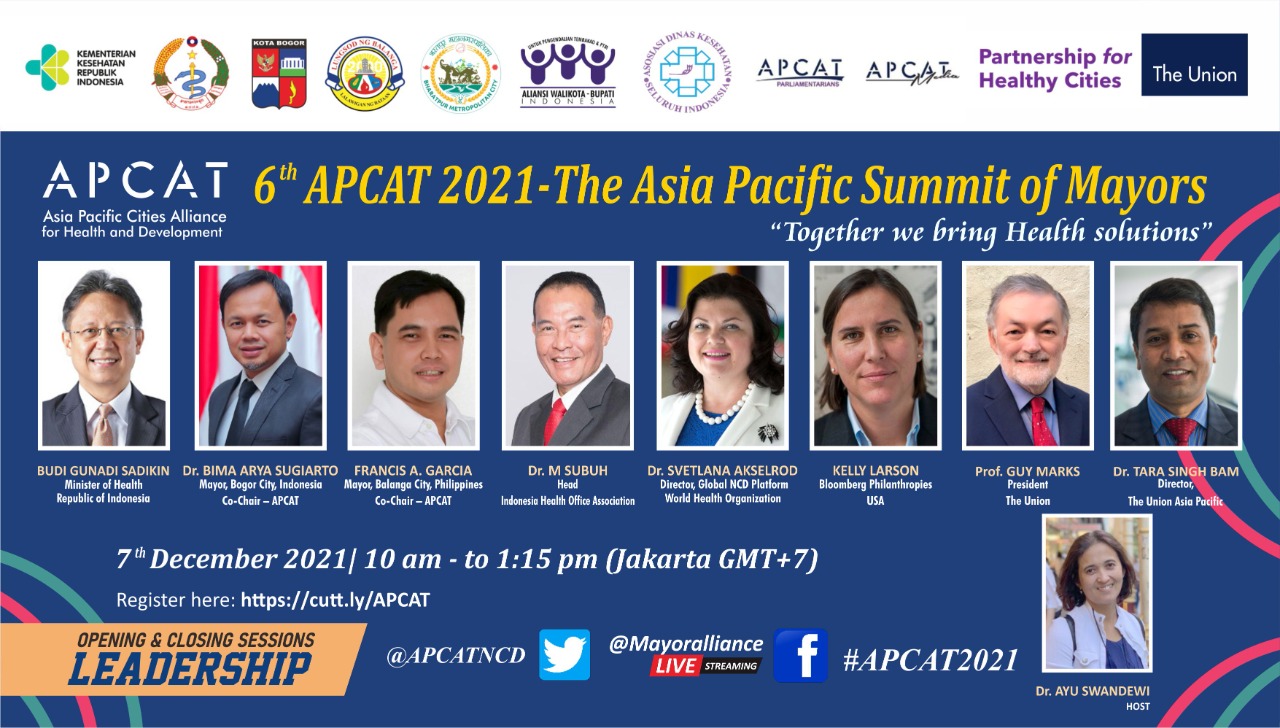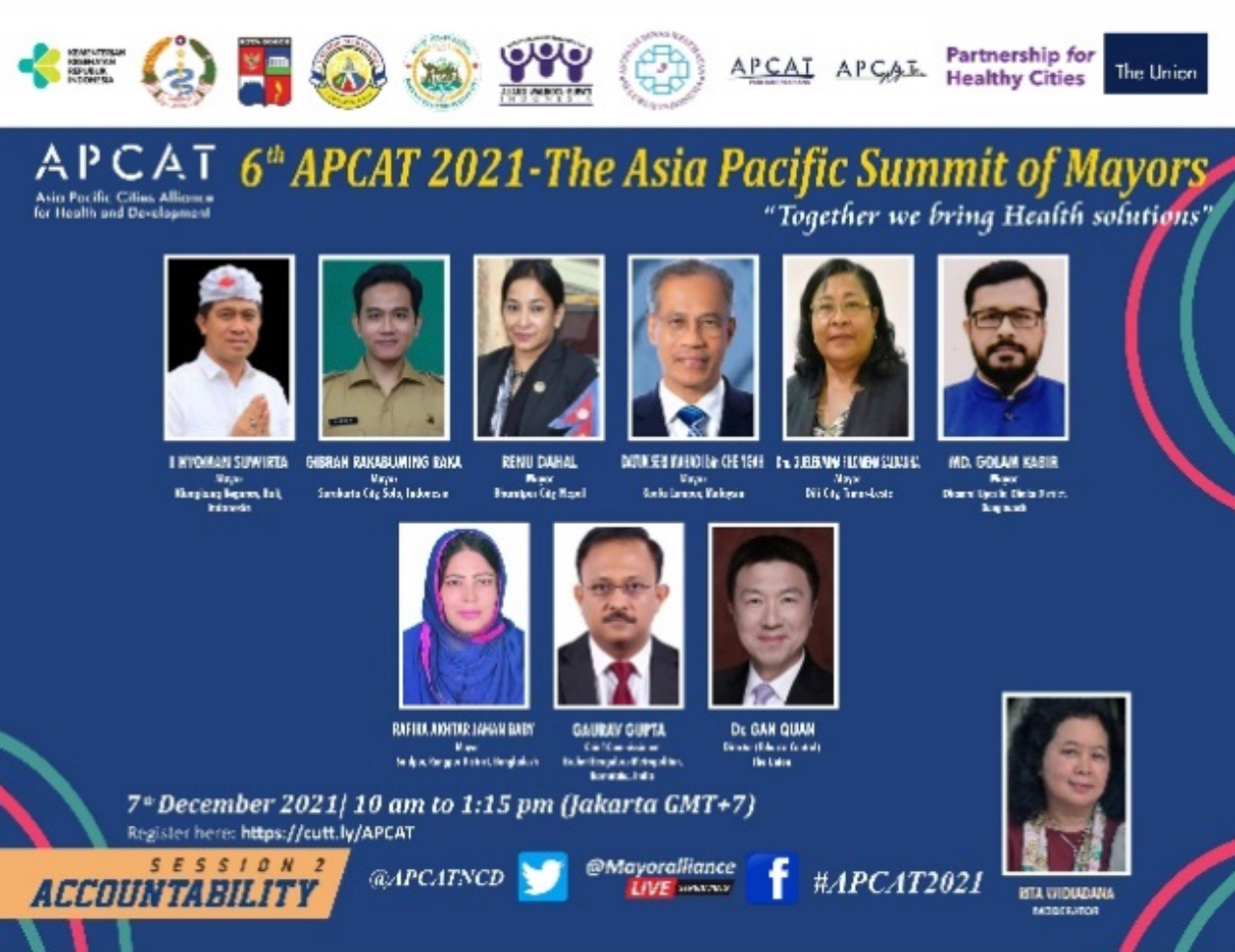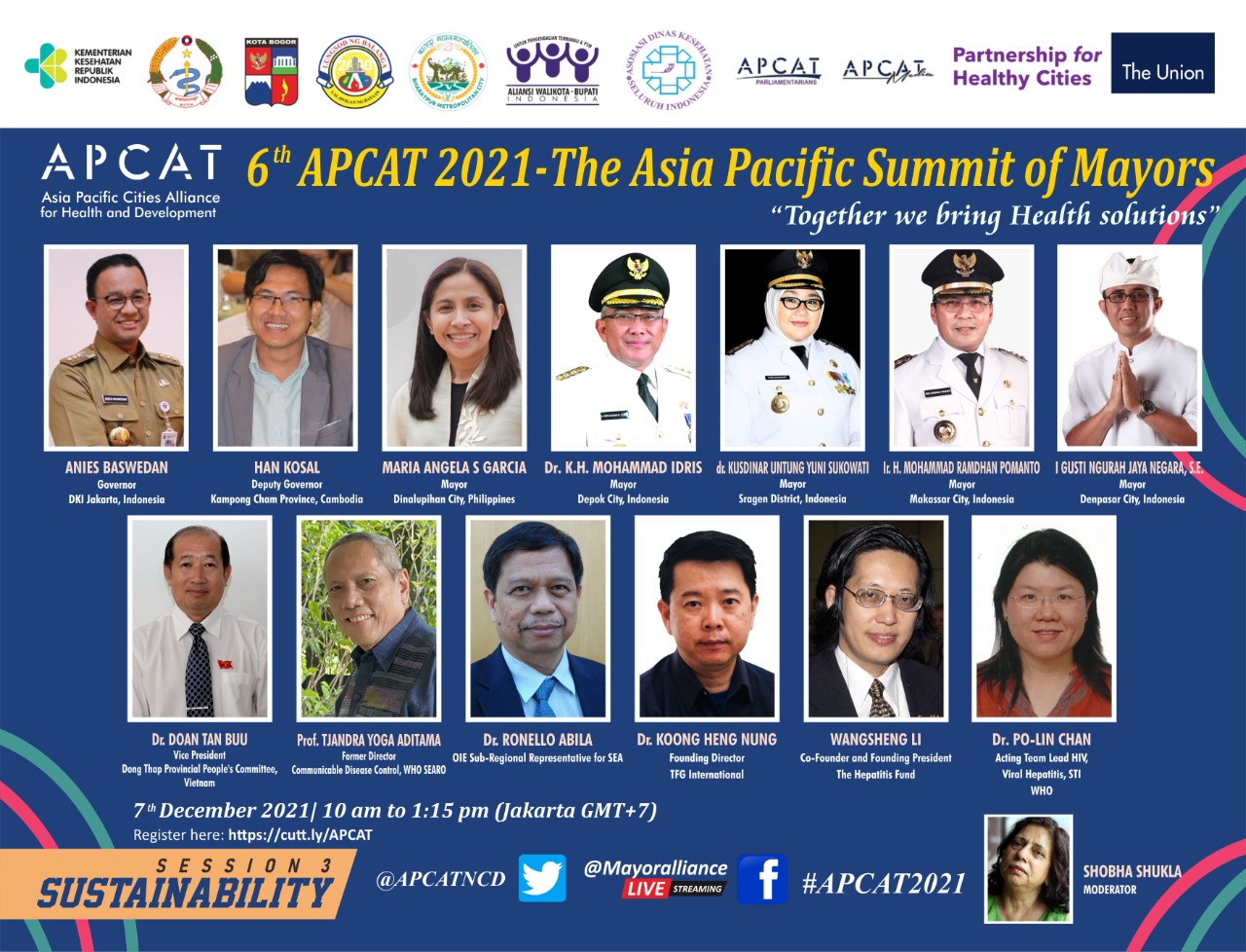
6th APCAT SUMMIT
The 6th Asia Pacific Summit of Mayors (6th APCAT Summit) was held virtually on 7 December 2021 with the theme, “Together we bring health solutions”. The summit brough together over 800 delegates from 130 cities in 19 countries including Mayors, Governors, public health experts, media, and youth.
The 6th APCAT Summit delegates adopted the Declaration which commits subnational leaders for stronger action in advancing tobacco control, preventing NCDs, leveraging synergies between COVID-19 response and other health and development responses, and firewalling health and development policies and programmes from industry interferences. Moreover, it highlights the needs of sustaining routine vaccination programs, TB control and preventing mother to child transmission of viral hepatitis during pandemic to prevent secondary health crisis.
“Bogor City has achieved 89.05% Covid vaccination rate which is highest in West Jawa, Indonesia. I had instructed the hospitals in Bogor City to identify those who use tobacco because tobacco use can cause co-morbidities and lung diseases which put people at higher risk of Covid serious outcomes. That is why I ensured tobacco control activities continued during the pandemic as those who suffered severe Covid disease have been heavy smokers as well. Stopping smoking is part of Covid prevention protocol campaign in Bogor City” said Dr Bima Arya Sugiarto, Mayor of Bogor City in Indonesia, and co-Chair of APCAT.

“Tobacco control is an issue that requires multisectoral cooperation” said Francis A Garcia, Mayor of Balanga City in Philippines, and co-Chair of APCAT. That is why Mayors and other subnational leaders who are best placed to synergise multisectoral response locally for advancing tobacco control and prevention of non-communicable diseases, have united as APCAT. Today “subnational leaders of 78 cities from 12 countries in Asia Pacific region form APCAT”.
“Despite set back the pandemic imposes; Indonesia is committed to reduce youth smoking prevalence. To achieve this, Ministry of Health continues to advocate to impose the highest attainable taxes on tobacco products, adopt 90% pictorial health warnings on tobacco packaging and forbid the selling of single stick of cigarette and regulate electronic cigarettes,” said Budi Gunadi Sadikin, Minister of Health, Republic of Indonesia.
“The Union strives to end suffering due to tuberculosis and lung diseases, old and new, by advancing better prevention and care. We must ensure that no-one is left behind, people are treated equally and we have a focus on vulnerable and marginalised populations and communities,” said Dr Guy Marks, President of the International Union Against Tuberculosis and Lung Disease (The Union). “The problems are complex but the solutions are in the policy makers’ hands.”
“The double pandemic of the COVID-19 and noncommunicable diseases places us in an unprecedented crisis that cannot be solved by a single country or stakeholder. Only by scaling up global cooperation to bring together governments, WHO and other UN agencies, civil society, academia, and the private sector can we make progress towards a successful recovery and achieve SDG target 3.4, and universal health coverage” said Dr Svetlana Akselrod, Director of Global NCD Platform, World Health Organization.
“During COVID-19 pandemic, the tobacco industry tried to intensify their Corporate Social Responsibility (CSR) Campaigns and build relationships with the government. Countries need to incorporate the Article 5.3 of the FCTC into their domestic laws in order to prohibit influence of tobacco companies over tobacco control policies making” said Dr Gan Quan, Director for Tobacco Control, International Union Against Tuberculosis and Lung Disease (The Union).
“Tobacco control is an issue that requires multi-sectoral cooperation. The mayors’ alliance has made a great stride in promoting tobacco control throughout the Asia Pacific region. The Alliance is also a critical platform for sharing best practices and lesson learned among leaders” said Kelly Larson, Bloomberg Philanthropies.

“Tobacco control is an issue that requires multisectoral cooperation” said Francis A Garcia, Mayor of Balanga City in Philippines, and co-Chair of APCAT. That is why Mayors and other subnational leaders who are best placed to synergise multisectoral response locally for advancing tobacco control and prevention of non-communicable diseases, have united as APCAT. Today “subnational leaders of 78 cities from 12 countries in Asia Pacific region form APCAT”.
APCAT is a unique regional alliance of 78 mayors and sub-national leaders from 78 cities of the 12 countries (Bangladesh, Cambodia, India, Indonesia, Lao PDR, Malaysia, Myanmar, Nepal, Philippines, Singapore, Timor-Leste and Vietnam) in Asia Pacific that work collectively to gain political commitments to offer local solutions for local problems. It believes that the role of subnational leaders is the key to bring change through good city-level governance. They have also unique capacities of creating, maintaining, activating cross-sectors alliances/networks; fostering public-private partnerships; bridging subnational and national public health politics; implementing health interventions and sharing lessons learned.
The 6th APCAT summit was jointly organised by Asia Pacific Cities Alliance for Health and Development (APCAT), Ministry of Health, Republic of Indonesia; National Centre for Health Promotion, Ministry of Health, Cambodia; Bogor City, Indonesia; Balanga City, Philippines; Bharatpur Metropolitan, Nepal; Indonesia Mayor and Regent Alliance; Association of All Health Offices Indonesia (ADINKES), APCAT Parliamentarians, APCAT Media, Partnership for Healthy Cities and The International Union Against Tuberculosis and Lung Disease (The Union). The Union Asia Pacific Office is the alliance secretariat.
Read the report here
6th APCAT SUMMIT OPENING HIGHLIGHTS
Subscribe to our Mailing list
Get latest updates on events, press releases and more !
